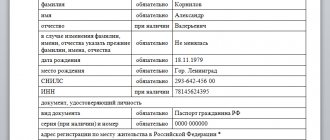The second and final procedure on the path to recognizing financial insolvency is the sale of property in the event of bankruptcy of individuals. It allows you to pay off debts or part of them through the sale of the bankrupt’s property.
If the value of the property is not enough to repay the debt, then as a result of the procedure the debts will be written off. Let's consider how long the implementation procedure lasts and how it goes, who is responsible for its implementation and what nuances the bankrupt needs to take into account in the process.
In what cases is it possible to use the implementation procedure?
How does restructuring proceed in the event of bankruptcy of an individual?
Bankruptcy involves two stages
: introduction of a rehabilitation procedure and direct sale of property. Rehabilitation in this case is debt restructuring: a plan is drawn up to repay the bankrupt’s debts, which he must fulfill within 3 years. The schedule must receive approval from the creditors, the debtor, and the court.
According to the law, the sale of a citizen’s property can occur only after debt restructuring. In practice, in 80% of cases, the sale of the property of a debtor declared bankrupt is introduced immediately. This may occur due to the low income of the debtor, lack of stable wages, too much debt and other circumstances.
Sale of property
debtor is entered if:
- the parties did not submit a debt repayment plan for consideration by the court (the schedule can be proposed by any interested participants in the bankruptcy case);
- the debtor does not have enough income to fully cover the debt for 3 years (for example, if the debt is 2 million rubles, and the monthly income is 20,000 rubles, for which you still need to support your family);
- the court rejected the proposed schedule (for example, if it significantly violates the interests of the debtor: it forces him to give 80% of his income to pay off the debt, etc.);
- debt restructuring was nevertheless introduced, but the debtor violated the terms of the plan for settlement with creditors;
- the parties entered into a settlement agreement, which was later violated by the debtor or one of the creditors;
- in the application for recognition of bankruptcy, the debtor requested to proceed directly to the procedure for the sale of property (such a right is guaranteed by the Federal Law “On Bankruptcy”).
What selling price is beneficial to the debtor?
The struggle between the interests of creditors and the debtor can begin already from the stage of property valuation.
If we are talking about restoring the debtor’s solvency, then a conflict, as a rule, does not arise, since it is beneficial for both creditors and the debtor’s representatives that the property be sold at the highest possible price. In order to quickly find buyers and sell assets with maximum profit, specialized enterprises and organizations in related industries are being studied. For example, in parallel with the formation of lots or proactively, mass mailing of letters is carried out on behalf of the manager with offers beneficial to potential buyers.
If we are talking about bankruptcy proceedings, then the debtor may be interested in maximizing the price reduction, changing the bidding step, and selling the property through a public offer to friendly creditors. Disloyal creditors still benefit from selling at “maximum rates.”
How long does it take to sell a property?
According to legal standards, the implementation period is on average 4-6 months. It is possible to extend the period for the sale of property if:
- disputes have arisen between the participants in the process requiring litigation;
- it is impossible to sell the property the first time, and a second and third stage of bidding is necessary;
- Additional time is needed for revaluation or examination of the property put up for sale and other circumstances.
Judicial practice: controversial car for a disabled person
In case No. A41-14878/16, disputes between the debtor and the creditor over property delayed the legal process. The first petitioned to exclude from the bankruptcy estate the car and income to support himself and his disabled wife. He needed a car to take his wife to the hospital and to get to work himself. The Constitutional Court and the Appeal agreed with the arguments and excluded what was required, but the Constitutional Court sided with the bank. The judge ruled that the law provides for the exclusion from the bankruptcy estate only of property or funds in the amount of up to 10 thousand rubles. The case was sent for a new review, and implementation was delayed indefinitely.
Is it possible to suspend a bankruptcy case?
Bankruptcy proceedings are suspended in exceptional cases.
The grounds for suspending the case may be:
- appealing a decision to declare a citizen bankrupt;
- appealing a settlement agreement signed between the debtor and creditors;
- appealing decisions of a meeting of creditors;
- other cases.
A petition to suspend the bankruptcy case can be filed by the debtor himself or any creditor. From the moment the ruling is made until the case is resumed, the debtor is freed from the restrictions imposed by the insolvency procedure.
Features of the guarantor bankruptcy procedure
Termination of bankruptcy proceedings
What property is subject to sale?
The law equally guarantees respect for the rights and freedoms of each party to the case. A bankrupt has the right to keep certain things to himself.
Property that cannot be sold includes:
- the only housing is an apartment or house with a plot;
- personal belongings - hygiene items, clothing, etc.;
- agricultural objects - buildings, sheds, tools, etc.;
- seeds for sowing, domestic animals;
- household items - household appliances, furniture, etc.;
- tools or equipment for work worth up to 10,000 rubles.
So, what can an individual take away in case of bankruptcy? Everything that was not listed in Art. 446 of the Code of Civil Procedure of the Russian Federation, namely: land plots, residential and non-residential real estate, luxury goods, etc.
If the debtor has no other property other than the one mentioned above, and the debt is less than 500 thousand rubles, starting from the fall of 2021, debts can be written off in an out-of-court (simplified) manner. The application is submitted to the MFC; the debtor does not bear the costs of the procedure.
How to file for bankruptcy of an individual through the MFC
Only those debtors in respect of whom the bailiff has issued a resolution to terminate enforcement proceedings due to lack of property will be able to take advantage of extrajudicial bankruptcy (clause 4, part 1, article 46 No. 229-FZ).
However, if the debts were not settled, or the bailiff service completed the proceedings for another reason (for example, if it was impossible to determine the location of the debtor), then the MFC employee will be forced to return the application for bankruptcy.
You can re-apply to the multifunctional center for insolvency after a month.
Features of the sale of bankrupt property
Control over the debtor's assets during the formation of the bankruptcy estate and the subsequent sale of property in the bankruptcy case is transferred to the manager. The latter’s actions can be appealed to the court by both the individual and his creditors.
Important . The procedure for selling property in the event of bankruptcy of an individual with the status of an individual entrepreneur is somewhat different from the usual one. Assets that were used directly for running a business are sold according to the rules established for legal entities, and the remaining property is sold according to the standard procedure.
Spouses' property: will the debtor's family suffer in bankruptcy?
The legal status of property acquired jointly during marriage is specifically regulated by the legislator. The Family Code of the Russian Federation speaks about this (Article 34 of the RF IC).
Example:
Case No. A54-1301/2016 presents a situation where the interests of the bankrupt’s spouse are required to be taken into account as part of the sale of the debtor’s property in bankruptcy proceedings. The debtor's wife started dividing the property after her husband applied to arbitration and bankruptcy was declared against him.
The woman was refused both in the court of general jurisdiction and in the arbitration court, but the Supreme Court of the Russian Federation, in its decision No. b-KP 8-1, took her side and indicated that the second spouse retained the right to a share of the property.
In practice, in a marriage, a regime of joint ownership arises, which means that according to the general rules, if the spouses do not divorce and do not divide property, everything they own is sold, after which half of the proceeds from the auction are returned to the second spouse.
Is it possible to declare bankruptcy if there is no property?
Yes, they admit it. According to the law, forced bankruptcy of individuals is possible with a debt of 500 thousand rubles and a delay of 3 months. But if a person has lost his job or another source of income, he has the right to voluntarily file for bankruptcy earlier; there is no need to save up and increase debt. Considering the costs of the procedure, it is profitable to start bankruptcy with a debt of 300,000 rubles or more.
Bankruptcy is also possible if the debtor has no property. It doesn’t matter whether the property includes apartments, land, cars and valuables. Even if there is no property at all, a person has the right to admit insolvency.
Citizens planning to become bankrupt can be divided into 2 categories:
- There is no and there was no property. The financial manager will check the fact of insolvency, report to the court and petition to write off the individual’s debts. The procedure will take 6-7 months.
- Previously there was property. The legislation provides that financial managers have the right to challenge transactions that were concluded 3 years before the procedure. If there were such transactions, the procedure will be delayed: the period is from 7 to 12 months.
From the experience of financial managers:
- Bankruptcy procedure for a woman with loan debts totaling 1.6 million. The lady sold a plot of land 2 years ago for 700,000 rubles. At that time, the debtor already had regular arrears on loans. When bankruptcy began, creditors tried to challenge the sale of the site.
After checking, it turned out that the transaction actually took place, but it was not possible to challenge it. The price of the plot was market value, and the buyer was an outsider not related to the bankrupt. Transactions concluded without the intent to harm the interests of creditors are not invalidated.
Bankruptcy of the self-employedRelated article - A temporarily unemployed citizen who worked part-time as a self-employed person decided to declare bankruptcy.
There was no property other than a single home, but there was a loan in the amount of 1.7 million rubles, taken out 2 years ago. The man regularly repaid the loan until he was fired from his job 5 months ago. After checking, it turned out that 3 months ago the man sold his car worth 850,000 rubles. The car went to my brother for 50 thousand. The court canceled the deal - the price was non-market, and the buyer was affiliated with the bankrupt. The car was sold at auction. The debts were written off completely.
Stages of property sales
This process is carried out in several stages:
- Drawing up a register of creditors.
Typically, claimants are given 2 months during which they must state their claims. Creditors can find out about the bankruptcy of a particular citizen in the EFRSB (publications are made by a financial manager appointed by the court).Interesting incidents arise when selling collateral. If the deadline is missed, the creditor is not included in the register. This happened in case No. A05-3506/2016, where the secured creditor was not included in the register in a timely manner. In this regard, the bankrupt demanded to exclude the mortgaged housing from the bankruptcy estate on the basis that it is his only one.
The lower courts considered that the absence of a secured creditor does not provide such an opportunity, and the apartment should be sold in favor of the remaining claimants. However, the Supreme Court of the Russian Federation, in its ruling dated June 13, 2019 No. 307-ES19-358, did not agree with them and returned the case for a new review.
- Formation of the bankruptcy estate.
This includes the following processes:- inventory;
seizure;
- property valuation.
In most cases, the assessment is carried out by the financial manager himself, but in controversial situations, professional experts are involved. Their work is paid for by the party that invited the appraisers to participate.
At the same stage, the debtor may apply for exclusion from the bankruptcy estate of property that:
- protected by legislative immunity;
- costs no more than 10,000 rubles.
The financial manager is obliged to check whether the debtor has tried to hide any property, and whether he really found himself in difficult circumstances. If, however, signs of premeditation and fictitiousness are present, then the debts will not be written off, and the debtor himself will fall under liability under Art. 196 - 197 of the Criminal Code of the Russian Federation.
This process can be divided into 2 stages:
- sale of movable property worth up to 100,000 rubles;
It can be sold through advertisements on thematic platforms. - sale of expensive real estate and other property.
This is carried out through the involvement of an organizer for conducting electronic trading at auctions. It can be carried out in several stages, after which the remaining property:will be offered to creditors as payment of debt;
or will be transferred to the bankrupt back into ownership.
At this stage, the financial manager must:
- carry out settlements with creditors;
Source
Article 20.6. Remuneration of an arbitration manager in a bankruptcy case
- The arbitration manager has the right to remuneration in a bankruptcy case, as well as to full compensation for expenses actually incurred by him in the performance of his duties in a bankruptcy case.
- Remuneration in a bankruptcy case is paid to the arbitration manager at the expense of the debtor, unless otherwise provided by this Federal Law.
- The remuneration paid to the arbitration manager in a bankruptcy case consists of a fixed amount and an amount of interest. The fixed amount of such remuneration is for: financial manager - twenty-five thousand rubles at a time for carrying out the procedure used in a bankruptcy case.
- The amount of interest on the remuneration of the financial manager in the event of introducing a procedure for the sale of a citizen’s property is seven percent of the amount of proceeds from the sale of the citizen’s property and funds received as a result of the collection of receivables, as well as as a result of the application of the consequences of invalid transactions. This interest is paid to the financial manager upon completion of settlements with creditors.
Federal Law of October 26, 2002 N 127-FZ “On Insolvency (Bankruptcy)”
Read completely
At the final hearing, the court reviews the report and closes the case, writing off the remaining debts and releasing the citizen from obligations to creditors.
Bidding in bankruptcy of a citizen
Bankruptcy auctions are held in 3 stages:
- Auction with increasing value. The basis is the market price of the property in increments of 5–10% of the amount. The participant who offers the maximum price wins.
- If there are no applications or if only one applicant participates in the auction, the auction is considered invalid. Then the property is relisted at a discount of 10–30%.
- At the final stage, auctions are held with a decrease in value, applied to illiquid property. The cost is reduced, for example, by 10% every week, until the first purchase request.
- If no buyers are found, the property is offered to creditors in kind.
- If the creditors refuse, then the object is transferred back to the bankrupt with the drawing up of a transfer and acceptance certificate.
Sale of property as collateral
The sale of pledged property is carried out under the control of the pledge bank.
If the bank is involved in bankruptcy, the mortgaged apartment is sold, even if it is the only one. 80% of the proceeds will be transferred to the mortgagee, 7% will be the remuneration of the arbitration manager, and the rest will be used to satisfy the claims of other creditors and pay off expenses.
The same scheme will apply to the sale of a pawned car if you took out a loan to purchase it, and even if you pawned your car at a pawnshop or microfinance organization to receive cash.
If you took out a loan for a kettle or a bicycle, then most likely they will not be confiscated from you and sold at auction. Unless, of course, it's a brand new bike of a very expensive brand.
Things are more complicated with electronic equipment. These are home theaters, expensive gaming laptops. The financial manager will decide whether to withdraw and sell them.
When deciding on bankruptcy, you must understand that you will have to part with part of your property
According to the court, a car, jewelry, a summer house, a second apartment, a plasma TV on an entire wall, fur coats and expensive laptops can be sold to pay off debts. As a rule, a person who decides to go bankrupt no longer has such values - or never had them. Therefore, a potential bankrupt no longer has to be afraid of the word “realization”. The court will not deprive you of your last money.
Consequences of introducing an implementation procedure
If the debtor does not have any property, he does not risk anything. The procedure will be carried out without sales or bidding, and debts will be written off upon completion of all formalities. If you still have property, it is important to remember how the process works:
- pledged property must be sold
, even if it is protected by legislative immunity.This also applies to mortgages - if the only housing is in fact secured by the bank, then it is subject to sale;
- transactions entered into within three years before bankruptcy may be challenged
at the discretion of the financial manager.You should not rewrite your property or draw up gift agreements immediately before the procedure for establishing your insolvency. Such a transaction will quickly arouse suspicion, and the manager will file a lawsuit to declare it invalid.
also include
:
- the need to transfer control over your income to a financial manager for the duration of the entire implementation procedure, who will dispose of them legally;
- the court may decide to impose a ban on the debtor’s travel abroad of the Russian Federation. However, this ban is automatically lifted after the completion of the sale of the citizen’s property.
Do you need to declare bankruptcy? Contact professional specialists! We have successfully assisted in bankruptcy recognition and debt relief in over 3,000 cases. Our team consists of experienced lawyers, crisis managers and economists.
We practice a team approach and individual search for solutions to each case, thanks to which we are able to achieve success even in the most difficult circumstances. We will make sure that your case is resolved in your favor and in the shortest possible time!
Samples of documents for the sale of property
Application form for the introduction of the sale of property (17.1 KB)
Sample of filling out an inventory of the debtor's property (574.9 KB)
How is property assessed?
The property is assessed by an arbitration manager.
- For these purposes, he hires expert specialists.
- Taking into account this information, the manager forms a regulation on the sale of property. This provision is approved by the arbitration court. However, what to do if you do not agree with the value determined by the arbitration manager.
- The law provides for the right of a debtor citizen to challenge the actions of the financial manager. Including actions to evaluate property. However, it is necessary to challenge the assessment precisely within the framework of the manager’s petition for approval of the regulation on the sale of property. For these purposes, it is certainly necessary to submit a counter-report on the assessment to the court hearing, and, if necessary, appoint a judicial assessment examination.
From the foregoing it follows that it is necessary to challenge the assessment at the stage of its approval, and not at the stage when the property has already been sold. In practice, many take the path of challenging tenders, citing an incorrect assessment. However, this path will most likely be incorrect, and the court will recognize the auction as valid.
From the general provisions on property valuation, it is necessary to highlight the category of property, the valuation procedure of which is different. Namely, the assessment of the mortgaged property.
In particular, the law provides for the right of the secured creditor to independently develop regulations on the sale of property. This provision does not require approval by the court, and from the moment this provision is received by the manager, he begins to sell the property. However, the provision must first be published in the bankruptcy register. If you do not agree with the initial sale price of the pledged property, you need to go through the following steps:
Checking the validity of your objections. Namely, you can order your own independent report on the assessment of the pledged property.
If your fears are confirmed and the amount determined by the bank is incorrect, you must go to court. To do this, it is necessary to prepare a statement of dispute resolution. Based on this application, the court approved the regulation on the sale of property through bankruptcy auctions (more information about the procedure at the link).
FAQ
I live in a house. There is also a share in a city apartment. Will this share be sold if I file for bankruptcy?
Yes, the second home is subject to sale. An inventory of the property will be taken, your part of the apartment will be appraised and included in the bankruptcy estate. Next, the share is put up for sale through electronic trading. If they still don’t buy it (shares in real estate are not very popular among buyers), then the financial manager will first offer it to creditors. If they refuse, it will be transferred back to you according to the acceptance certificate.
Two years ago I gave my granddaughter a dacha - a plot of land with outbuildings. I'm about to file for bankruptcy. Will the gift agreement be challenged?
Rest assured, the transaction will definitely be identified and its circumstances will be analyzed. It matters what your financial situation was at the time of donation. If there were already debts then, then the deal will almost certainly be challenged, and the dacha will be returned to the bankruptcy estate. If at that time there were no delays, then the transaction is unlikely to be considered suspicious.
My only home is a house outside the city. Can they sell it in bankruptcy in order to buy simpler real estate in return?
Not yet. Law enforcement practice regarding the sale of single housing is still being discussed. Therefore, if you are going to declare bankruptcy, it is better to do it now.
During the divorce, the husband got the car, the wife got the house. Will there be problems with his car if his wife goes through bankruptcy?
It all depends on when the debts arose and who spent the money that was loaned. If, for example, you bought a car with this money, and in general the spouses spent the loans together, then there is a risk that creditors will make claims against the car.
We will write off your debts through bankruptcy with a guarantee
A lawyer will call you back in 1 minute and provide advice. It's free.
Practice: preserve property and get rid of debts
Bankruptcy is the only legal way to get rid of debts if you have nothing to pay banks and microfinance organizations. Recognition of the debtor's insolvency implies the sale of property in order to repay the debts at least partially. Citizens ask how to save property, and is there anything they need to do before going to court?
- If a person has only one apartment
, then you don’t need to do anything with it. As a general rule, housing is not sold. Only if you have an elite living space in an expensive area, in 2021 creditors may try to recognize the housing as luxurious and demand replacement with a cheaper one, citing clarifications of the Constitutional Court of the Russian Federation.But to do this, they will have to prove that the debtor bought the apartment in order to save money from collection. Moreover, in exchange for an elite one, lenders must buy a simpler apartment in the same area. That is, spend your money. In practice, the sale of the only home occurs in rare cases when a person cheated and bought a huge apartment or house with borrowed funds.
- If there are other real estate objects
: a second apartment, a house, a garage, a parking space, a land plot, unfinished construction projects, or cars, motorcycles and any equipment that is registered with government agencies, then be prepared that the objects will be sold.
Call a lawyer to prepare for the procedure, collect documents, and decide how to sell the property - before filing an application or through an auction. Do not make transactions with property without consulting a bankruptcy lawyer. It is the excessive activity of debtors that creates problems and disputes in the procedure.
What not to do before bankruptcy
The financial manager listed the mistakes that delay the case and complicate the bankrupt’s position.
- Alienation of property in favor of relatives, or through a gift agreement.
Legislation in 2021 provides that transactions concluded within 3 years before recognition of insolvency can be challenged by the financial manager and creditors. As a result, the donated property is seized and included in the bankruptcy estate. - Selling property at a reduced price.
If shortly before bankruptcy the debtor sold his property at a price less than 30% of the market price, the transaction may be challenged. In practice, transactions often occur in this way: the purchase and sale agreement indicates an undervalued value, the remaining funds are transferred from hand to hand by receipt.You shouldn’t do this, especially before bankruptcy. A non-market price indicates the debtor’s bad faith; the property will be returned to the bankruptcy estate. The time and cost of the procedure will increase, and debt write-off will be in jeopardy on the basis of clause 4 of Art. 213.28.
- Full settlement with one of the creditors to the detriment of the others.
If a person owes several banks, by paying off the debt to only one, he will violate the interests of the remaining creditors. Transactions with preference are canceled, and the debtor risks being left with debts - the court does not release persons acting in bad faith from their obligations. - Recognition of bankruptcy of spouses separately.
If spouses have accumulated common debts, then it is advisable to file for bankruptcy jointly - then you will have to pay not for 2 cases, but for one, and the terms are also half as long. If you go bankrupt separately, the financial managers of the spouses will face the problem of dividing property, which will lead to a delay in both cases.
The main advice is not to sell or give away property without consulting a bankruptcy lawyer. Such amateur activities lead to loss of property and money.
What benefits does a citizen receive from completing the bankruptcy procedure?
Thanks to the financial insolvency procedure, a citizen has a chance to pay off debts to creditors on preferential terms and restore his solvency.
During the bankruptcy process and after its completion, a number of positive consequences occur for the debtor
accrual of penalties, penalties and fines ceases;
enforcement proceedings are suspended and then terminated;
seizures are lifted from the citizen’s property;
Once the procedure is completed, most debts are written off.
Once the bankruptcy is completed, creditors will not be able to make demands for payment of the debt again. As a result, the citizen is freed from hopeless financial obligations.








